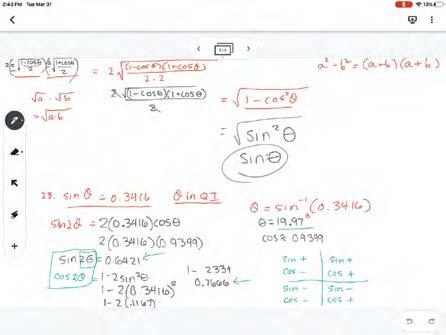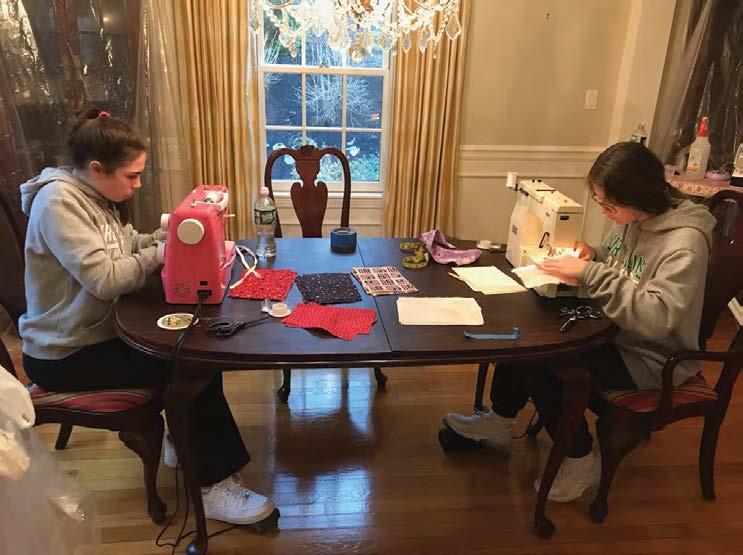
8 minute read
Unwavering in the Face of Adversity
Math teacher Kathy MacKenzie gets ready to greet her AP Computer Science students during the early days of remote learning this spring.
by Janet Reynolds, Admissions and Advancement Assistant
Advertisement
Friday, March 13, 2020, 12:35 p.m.: In the midst of the rapidly developing concern over the spread of COVID-19, teachers and students at Ursuline Academy are informed that the school building will close and all classes will be held via remote learning for two weeks beginning on Monday, March 16. Earlier that day, teachers held practice “remote learning” sessions with the school technology team as a temporary shutdown of the school appeared to be inevitable.
Teachers, students, and staff were sent home laden with books, iPads, and the promise of a new chapter of learning in the days ahead. On Monday, March 16, at 8 a.m., Ursuline teachers and students began operating on their remote learning platform. Only days into their two-week furlough, Governor Charlie Baker issued a directive for all schools to remain closed through at least May 4. On April 21, the closure was extended through the end of the current school year.
With a situation that quickly developed nationwide, educators all over the country scrambled to design and deliver the daily experience of “school” in a vastly different way than usual. Here’s how Ursuline Academy rose to the occasion and has been managing the highs and lows of distance learning during the COVID-19 crisis.
– Katherine Ginnetty, Dean of Academics
Ursuline Academy was fortunate to have had the digital infrastructure in place to adapt quickly to the evolving situation. Students had their own personal devices and had already been enrolled in online class learning spaces, and teachers were familiar with delivering content electronically. The school provided additional support to faculty in the final in-person days of school with one-on-one meetings, a new web page to share tools for distance learning, and two “test” classes delivered online. UA Director of Innovation Greg Mertz explains that this, “combined with an attitude of caring and understanding, helped to ease the bumps of making such a dramatic transition.” With such uncertain conditions, course corrections were anticipated and quickly instituted. After the first two weeks of learning, Ursuline adopted a “split schedule,” in which students were given Wednesdays off from formal instruction as time to meet virtually with teachers and consolidate their learning.
Based on the wealth of experience in the school prior to this crisis, Dean of Academics Katherine Ginnetty had every confidence in the faculty and student body to rise to this challenge. “UA’s curriculum incorporates the best technology has to offer: from our science labs with their whiteboardtopped counter spaces that facilitate students’ sharing design solutions to the amazing iHub, which allows for virtual reality and for students to work as interns and dive deeply into 3D printing, students have basic comfort with devices as tools for learning. While the actual experience of the closeknit Ursuline classroom is on hiatus, the support structures and caring community that form the nexus for learning are very much in practice remotely.”

Tools like Jamboard allow students and teachers to collaborate on a whiteboard together remotely.
VOICES FROM THE FACULTY
“We have all been forced out of our comfort zones. But I have been so impressed by the resilience and resourcefulness of the community in general. One great benefit for me, and I think for the whole community, has been hearing the voice of our Campus Ministers every day through their reflections and prayers. They have shown such beautiful insight and given great comfort to everyone through their wise and heartfelt words.”
– Yvonne Racine, Theology Teacher
“I always knew our students were resilient and adaptable, but learning remotely has made those qualities even more apparent. Student feedback through the use of digital surveys was invaluable in helping me configure my classes to provide the most benefit to my students. All the while, the students remained flexible and hardworking, and I have so much respect for how they conducted themselves during this trying time. I am confident that if remote learning, or some variation of remote learning, extends to the fall, Ursuline will find the most effective way to continue educating our incredible students.”
– Kellynd Graham P’25, Biology Teacher
ISOLATING TOGETHER: STUDENT PERSPECTIVE
“The transition to distance learning has presented many challenges to our day-to-day lives and forced us to be more creative. Although we started strong with a routine of meeting at the dining table to complete our assignments, we soon found it easier to remain isolated in our bedrooms free from distraction, only leaving for food, water, and the occasional social interaction with one another.
Our most recent innovation is sticky notes on our bedroom doors. These act as warnings to others when we have Zoom calls and exams. (Unfortunately, being from a large family, these notes tend to be ignored!)
As difficult as this has been for us, we know that Ursuline has been making an effort to make this work for everyone and we are appreciative of our teachers’ dedication to our education and giving us hope for the future.”
– Cecilia Rose ’20 (pictured top right with her Ursuline sisters)
Cecilia ’20, Eileen ’23, Gabrielle ’21, and Bernadette ’25 Rose

“…The hardest part of remote learning was just not being able to have the personal connection with my teachers and peers, but the teachers have been incredibly accommodating to the situation…they created plenty of opportunities to do things like Zoom and Google Meet to help us stay connected to one another.”
– Catherine Butera ’21
Feedback from families has been good. One seventh-grade parent noted that her daughter continued to learn new content and that “the staff easily leveraged the technology students use every day in class to support students during an extended period of school closure.” Another parent of a senior agreed that “a great deal of learning was happening, including many lessons for our young people well beyond the usual subjects.”
Students adjusted as well. Catherine Butera ’21 says “The hardest part of remote learning was just not being able to have the personal connection with my teachers and peers, but the teachers have been incredibly accommodating to the situation. Although they couldn’t fully make up for being able to see everyone in person, they created plenty of opportunities to do things like Zoom and Google Meet to help us stay connected to one another.”
Behind the scenes, outside of continuing the school’s academic rigor, a lot of other adjustments and changes continued to take place to keep a sense of business as usual. Teachers and administrators made every effort to provide connectedness in new ways. Daily announcements were posted each morning and afternoon to the schoolwide distance learning classroom, and the student council met remotely every week to plan opportunities for their classmates to continue to interact. The spring musical rehearsed via videoconferencing several afternoons a week, and
Hannah ’21 and Fiona ’23 Daly used their newfound time to sew patriotic masks for the Boston Police Department.

a virtual performance was shared with the community during its Festival of the Arts week in May. Other clubs continued to meet virtually as well.
Principal Mary-Kate Tracy ’94 salutes the school’s “foundation of understanding and compassion for students during a time of great uncertainty for their families and the world.” She credits Ursuline’s tradition of Serviam with encouraging the community to find ways to be of service to others in need during this time. “Our students and faculty have been busy both learning and serving by creating masks for healthcare workers, providing support to elderly relatives, or sharing food at local food pantries. Even during this unprecedented time, our young women are the latest generation in a proud 500-year tradition of making a difference in the world during a challenging time.”
Like schools everywhere, however, hard decisions and disappointments have been inevitable. The eighth-grade trip to Philadelphia, scheduled for May, has been postponed until November. An international trip to Europe has been pushed back from June until next year. The start of the spring athletic season was delayed several times, and then called off altogether, crushing the hopes of student-athletes, especially the seniors. SATs were canceled, and juniors eager to go on college tours were put in a holding pattern. Seniors’ final decisions on where to enroll in September were on shifting sands. And graduation and other special events for seniors all had a different look this year. For a school with deep and long-standing traditions, students are wistful about the turn of events.
Through it all, the Ursuline community remains positive. There have been ups and downs, but the school is committed to tending both the academic and emotional needs of the faculty and the students. While COVID-19 continues to disrupt lives and routines, it presented the opportunity for Ursuline to employ new teaching techniques and approaches. “Throughout this period of remote operation,” says Ursuline Academy President Kate Levesque, “our intention is to maintain student-centered learning and a supportive educational environment. I’m deeply grateful for how beautifully our community has pulled together to do just that.”
Dean of Students Natalie Mayo thinks it worked. “I’ve been incredibly impressed with how well our students adjusted to this experience. They’ve kept up with their academic work, found time to help those in need and reach out to their friends, and they did it all with so much heart and positivity.”
VOICES FROM THE FACULTY
“It has been an amazing experience to realize that our community is not defined by where we are physically. From the video morning prayers to the daily interactions with faculty and students, the student government challenges, the department meetings, and the virtual prom and Kahoot quizzes, my heart is full as I am made aware of the extent of care and support we are able to provide for our students and each other. Another realization of note is that we and our students are capable of extraordinary things. What a blessing, and what an awesome confidence to take into the future for all of us, no matter where we’re going, whether back into a classroom or on to college or life in general.”
– Stacie Dowling, Math Teacher

